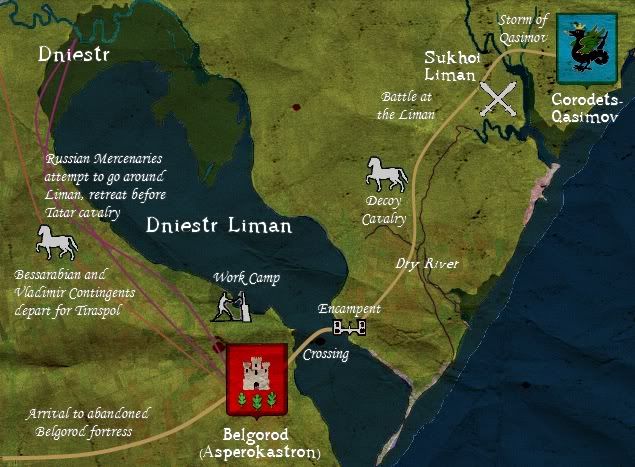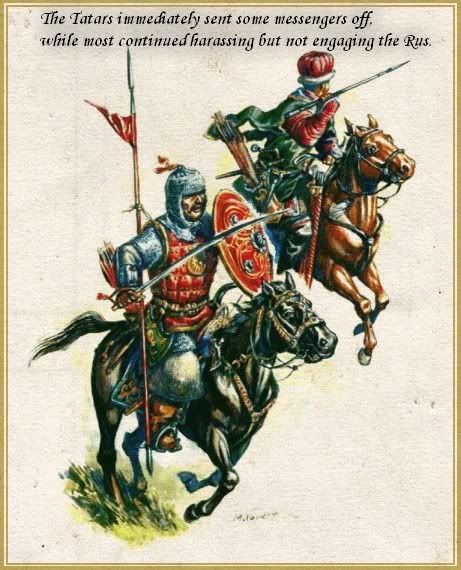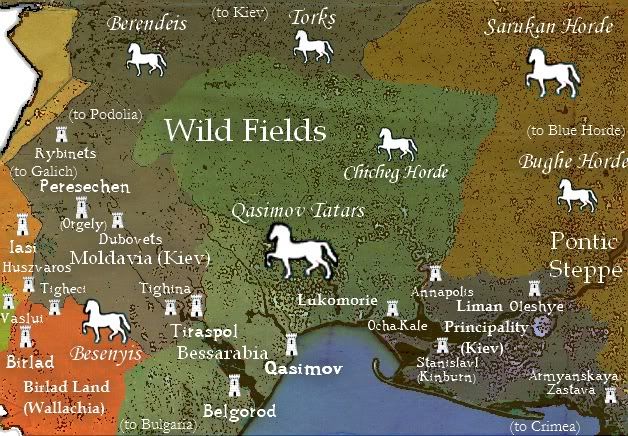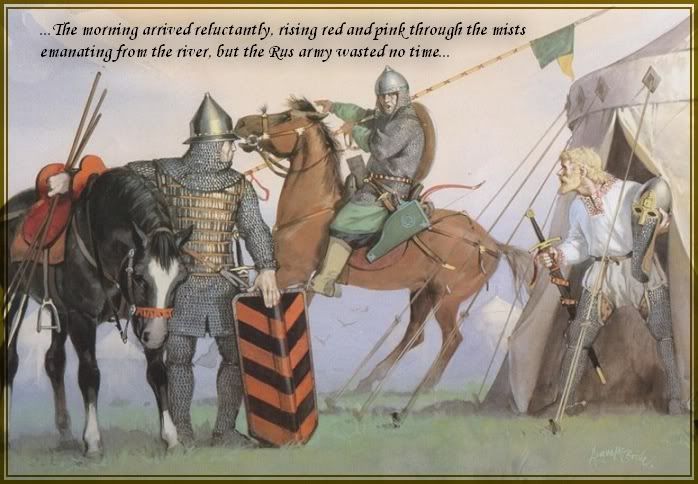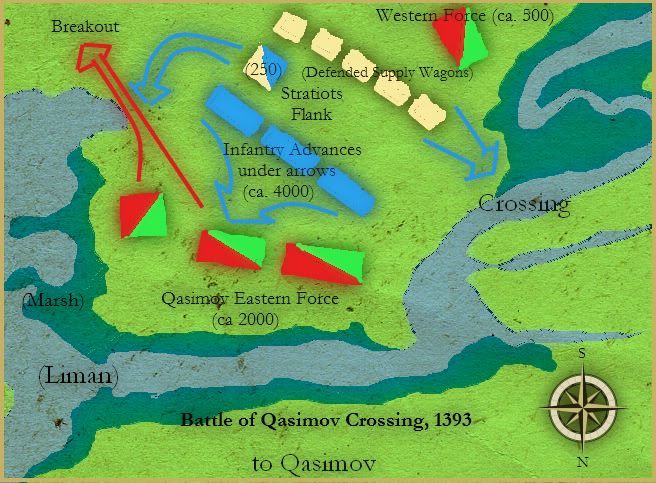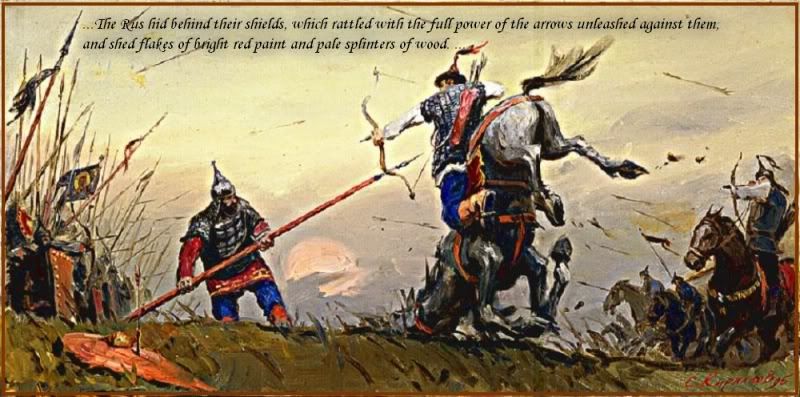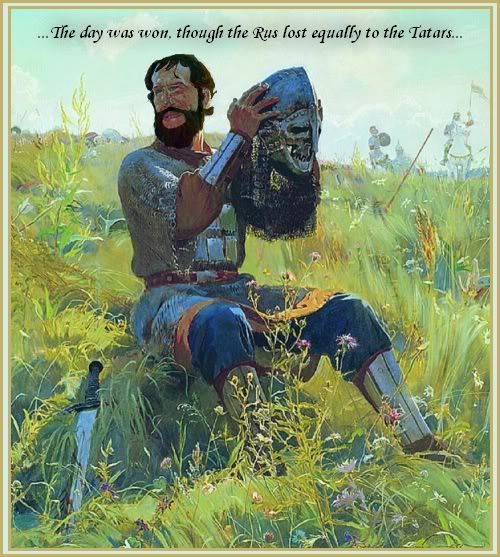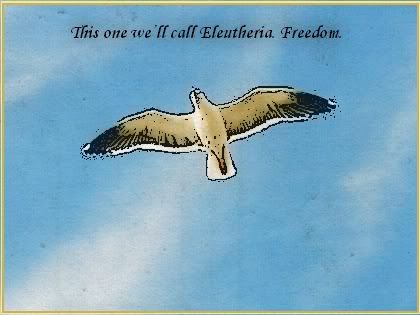From Rus to Russia
Waves of Blood and Grass
X
Timofey
The Tatar horsemen milled about just out of bowshot, persistent but few in numbers. The Rus army, having crossed the liman quickly through the day and the night at the cost of two overturned rafts and the men on them, was filing out of the makeshift fort. Timofey’s guard, all of two hundred, were ahorse and screening the infantry from the Tatars, matching their movements, though defensively, and to an untrained eye, sluggishly - keeping the horses fresh.
Behind the fort’s outer walls, the saws and hammers buzzed and drummed; the Rus were natural woodworkers, and not naturally at home on the steppe; put two obvious things together, and you get the obvious solution, Timofey’s father always said. In this case, it was an ancient technique that met the inspiration of several desperate minds among the council of captains. The supply wagons would be reinforced with a wall made of sawed timbers, three-quarters the height of a man. That side would face the Tatars, protecting Rus crossbowmen who bore no pavises, in case battle were joined. To attack, the Tatars would have to attempt flanking. Timofey hoped to catch them during the risky movement and hurt them enough to leave the column alone. Out in the open, his lightly armed spearmen stood little chance against the Qasimov horse archers, and his riders were too few to tangle with the Tatars – but why look for shelter when you can bring shelter with you? Steppe people and the people that bordered them used this tactic against each other as long as chroniclers marred parchment; but the walls would make the wagon
tabor even more effective.
Qasimov lay an impossible thirty miles away; the pace set by the heavy fortified supply carts would ensure this took two full days, and the narrow Sukhoi liman still lay between them and the city. At any point between now and then, the Tatars would launch their attack. Timofey had numbers, but little in the way of a counter; hopefully, the indecisive Qasimov riders would give him time to think of a plan, but knowing himself, the Rus
strategos admitted that he wouldn’t be able to quite plan anything really effective until the last moment. Planning without seeing the situation at hand was a waste of time and concentration, which was better spent ensuring the smooth nature of this armed march.
The sailors and freed prisoners would man the carts, pushing them forward; each cart would be defended by several crossbowmen, who would walk alongside it and clamber behind the shield if danger were to approach. The infantry, arrayed in smaller companies, would walk at some distance from the carts, shielded from Tatar view. The pack horses would be kept in reserve; if they were used to draw the wagons, they could be easily injured or killed, and disentangling a horse from the harness would use up precious time and break up the pace, leaving gaps in the defense. The
stratiots and the boyars’ sons would be kept in reserve. Strict formation, steady pace. He hoped his unusual force had the ability to accomplish all that, but did not voice these concerns. After another filthy but encouraging address, the carts crawled forward and the men marched behind them.
The Tatars immediately sent some messengers off, while most continued harassing but not engaging the Rus. A small group split off and started probing the responsiveness of the Rus rear guard. The
stratiots responded eagerly. The guards were unused to being deployed cautiously, and regarded themselves superior to the Tatars. The third time the response was a little too spirited, and they nearly fell into a trap between two wings of Qasimov cavalry. Thankfully, their captains had the good sense to withdraw. Timofey decided to act before a fourth time proved too much for the cavalry to handle.
He had numbers; the Tatars didn’t know how well-armed his men were or how many were capable of fighting. All they saw was many thousands snaking slowly across their lands. It was best to exploit that fear, and present them a force greater than they could hope to counter.
The unhitching of the supply horses provided him with the opportunity he sought. The remaining Vladimir infantry along with any others that had impressive-looking equipment were rounded up and ordered to mount the pack beasts, supply horses and any available remounts. If the enemies kept their wits about them, they would have easily seen through the ruse, but Timofey counted on fear clouding judgment. When the Tatars made their way around his column’s rear for the fourth time in the same day, the
stratiots turned and retreated. The Qasimov soldiers followed swiftly, until they almost ran into the decoy cavalry; the guards, boyars’ sons, and mounted infantry presented almost a thousand all together, even if every last horse had to be used for that purpose. As he had hoped, the Tatars saw the numbers and not the quality, and immediately turned and disappeared. They did not bother the Rus rear again, but it was doubtful they were truly gone. How many had remained to harass them from the west, and how many galloped off was impossible to tell.
“We seemed to have lost our escort,” the Tsar’s man told him shortly afterwards. Without the enemy around, he was no longer hiding quietly among the infantry. “I offer my congratulations.”
“They’re still around. They will keep bothering us until we reach the city.”
“What happens when we do reach it?”
“Depends on which half of the dancing hopping skipping running house we’re dealing with, I suppose.”
“I don’t understand,
strategos.”
“I will explain it when I am clearer about it myself. But trust me when I say we need to reach Kasimov.”
“You know, now that I think about it, we could have achieved that more easily if we used the boats we did have to sail around the sandbars and into the small liman ahead. They expected us on the shore where we landed, but not
behind them, if you know what I mean? This time of year, it must be quite flooded, and the tide, no matter how small, would only help us.”
Timofey opened his mouth to explain the impracticability of delivering the logs across the coastal surf, then suddenly stopped.
“
Boyarin, do you know much about floodplains?”
“Why yes. I grew up along this coast, though at the mouth of the Dneipr, of course, in Annapol. The limans are not immune to rising water; they flood and spread over the lowlands, turning the ground into marsh. Tricky when travelling. The one ahead is easily crossable in the height of summer, or so I’ve heard, but I expect it floods quite extensively otherwise.”
“Thank you. That is good to know.”
“I still don’t understand,
strategos, but I am glad to have been useful,” Kirill said doubtfully. Timofey, however, felt a tingle of pride at having stumped the courtier, and thereafter set about directing the progress happily. The Tatars waited until the end of the day, then sent another messenger. Once again, they professed that all they wanted was for the Rus to remain where they were, so that proper arrangements could be made; with darkness falling, the camp would have to be made anyway, so Timofey opted for yet another ruse, and sent a messenger to say that he agreed.
“They will attack us at night!” Kirill exclaimed, horrified, when the
strategoi convened again, but Timofey was pleased to see that most of the captains agreed with him. The Tatars didn’t want an outright fight; they wanted to stop the army in its tracks by any means, and the less it cost them, the better.
Nonetheless, the wagons were arranged in a defensive perimeter, and mounted patrols remained vigilant throughout the night, circling slowly in modest-sized groups under the light of the heavy, full moon. The horses and the men would be tired come tomorrow, and could not be relied on in battle, but keeping the men feeling secure and letting the Tatars know that precautions were taken was perhaps more important. If the Tatars got the jump on the camp in the night, there might not even be a battle to fight in the day that followed.
The morning arrived reluctantly, rising red and pink through the mists emanating from the river, but the Rus army wasted no time. They had a lot of ground to cover to reach the water, so that when the assault came, they would be protected on two sides, and receive the attack arrayed diagonally, both flanks anchored in the marsh. Food was served, armour was put on, and the army moved once again with the creaking of the wagon-wheels. The mist was slow to disperse, and most of the journey was done without seeing any opponents, including the tentative crossing of the liman’s smaller, shallower arms. The deep part of the lagoon was less than an hour away when the scouts returned from the east, riding foam-mouthed horses, and not far behind them was what looked like the entire Qasimov army.
Timofey groaned. He should have seen this, but he didn’t. Denied access with smaller forces to the rear, the faster Tatar riders massed a larger effort and circumvented the van instead, placing themselves between the water and the unprotected Russian infantry, and hid in the mist until it was time to strike. As he thought frantically of what to do next, a cry arose from the western edge of the column – the smaller Tatar force that screened them all this time engaged the wagons at last, to prevent attempts at circling the
tabor. And although the eastern force looked formidable, he could not but wonder - where were the rest of them? If he hesitated, the army would lose heart and they would be routed. They had to do something…
…they had to
attack. Timofey laughed heartily when he saw the obvious, startling people around him. The infantry was poor at running and good at advancing slowly. The Tatars needed space and didn’t like being pinned – but their clever maneouvering, designed to defeat his numbers, placed him precisely in the situation to use his numbers to pin them against the water. Put two obvious things together, and…
Still laughing like a madman, he spurred his horse onward and made his way along the infantry line, his guard following.
“Friends and brothers! I will ask you to do something that no Rus has done since the day of Sviatoslav! You hear me? We’ll be making history. We’re going to attack their cavalry on foot. And we’re going to win! The Tatar loves the plain, but this is a swamp. We love swamps. We don’t fear swamps. We were all practically born in one. We’re going to drive them into it and slaughter them. Hear me? Hear me?!”
They heard, they responded, but they were still lost, still afraid. The moment still hung in the balance. Behind the backs of the assembling spearmen, an incautious crossbowman fell from his wagon with a scream, picked off by the screening western force.
Timofey quickly turned to the captain of the Kievan
stratiots.
“Vadim, the lads are tired, but I have no-one else. I am going to dismount the boyars and have them use their lances in line with the infantry. They are more useful that way, without bows. Your men will need to close the gap between my line and the water behind us…but don’t you get into any real scraps, hear me?
When they decide to fight clear, let them. We want them gone. We want them gone away from us and away from the city. But until then, pretend you mean business.”
The
stratiots were reliable, at least, and kept their previous close grapple with the Tatars in mind; and being city cavalry rather than tagmatic troops, they obeyed him without question. Within minutes, they rode off south. The spear-line lined up, bulked with some of the haphazardly armed sailors and prisoners in the back and dismounted boyars’ sons in the front. Timofey and other captains remained the few men on horse, pacing alongside the infantry in the gaps between the hundreds. Their voices, calling encouragement to their units, rolled along the line; steady, loud, practiced, confident.
“Steady, steady! Walk brisk, walk bravely!”
“Hit the horses, spear the Tatars! If they come at you, your brothers guard your sides! Lively go!”
“Lively, briskly! Don’t want to be late to battle, do you?”
Arrows started hissing and falling between the ranks, some finding their marks among the lightly protected Kievans. Most had steel helmets, but the
kavadia did not save you from every arrow. Some fell, and were left behind.
“Eyes in to the front, one leg before the other!”
“Once you hit them, press them hard! Lively now!”
“Here they come! Forward! Forward! Ura!”
“Uraaaaaa!” the spear line responded, picking up pace, weapons pointing forward into the foe. “Uraaaaaaa!” echoed the mass of Qasimov horsemen. Neighbours, though now enemies, they both dealt with fear the same way.
The horsemen didn’t commit to their charge. Seeing the Rus prepared despite their surprise attack, the Tatars wheeled and let off arrows with great speed and accuracy from the lighter of the two bows hanging off every man’s saddle. Iron tips found soft throats and dealt gurgling deaths and ripped through patched
kavadia to puncture the lungs underneath. They sailed over the shields and bit into shoulders, boots and thighs. The line grew ragged with wounded men missing from their places. Not far from Timofey, an infantry
kentarch fell, crushed under his thrashing, dying horse, his men unable to drag him out. But the deadly storm was brief; letting off ten shots a minute, the Qasimov men emptied their quivers in just two passes, and withdrew to let their reserves attack. A few remained shooting, to keep up the pressure, but that was acceptable.
“Forward! Forward, I said!” Timofey roared, seeing the spearmen falter. They were not, after all, used to marching into death. Their role was to hold the line to let the cavalry regroup behind them. Not this time.
“Uraaaaaa!” – and the line pushed forward once again, quickly. Before the next arrow storm happened, the distance between the line and the sea was shorter by just a little less than an arrow’s flight. This time, riders wheeling in took special care to send some shots Timofey’s way, but somehow, he remained unharmed.
The Tatars came again. The Rus hid behind their shields, which rattled with the full power of the arrows unleashed against them, and shed flakes of bright red paint and pale splinters of wood. Thrown
sulisti and
djids landed into the shields with horrifying thuds, tempered heads forcing their way through the wood, leather and lacquer. Timofey hoped that the mercenaries and the wagon crews kept up their push to the northern arm of the liman; if the western Tatar force were to avoid them and hit his line in the back, his force was done for. Of necessity, he kept faith in his men.
The Rus learned their lessons, woken up by the early casualties, and defended more effectively. But the Qasimov men were quick learners too. When they retreated with empty quivers, the Rus lowered their shields and once again advanced, but the Tatar reserves were much closer this time, and released a deadly surprise volley before the spearmen were ready. The Rus line again halted midstride, and was locked behind the shields, making no more progress.
But the guard, as he hoped, came through. Appearing from the south, they at once engaged the Tatars, though at long range. They were good shots as well, though their horses were tired, robbing them of their nimbleness. The Tatars reacted with confusion. Timofey took advantage.
“See? There’s our lads, beating their lads. And you lot?” he shouted. “Don’t shame us!”
“Forward!” the captains responded, and forward the spear-line lurched, and kept going even under fire until the Qasimov horse was pressed closely against the water by a wall of spear-tips. The Tatars realized there was no victory to be had; some charged into the spears in desperation and there met their end; some fell back into the marshes, where they were later caught and cut down. The bulk saw the only possible exit, and headed south, straight at the
stratiots, who fled as planned. Those that didn't run South were surrounded, and had a grim time of it. In the end, they threw down their weapons and started pleading, calling upon shared faith and the name of the Mother of God and mercy of any kind. Timofey waited a little, then ordered the killing to stop.
The day was won, though the Rus lost equally to the Tatars. The western force, having failed to overcome the wagons, fled; the eastern force was broken. Choban-khan’s army was no more, and his plan to hold off the unwelcome Kievan interlopers until he could finish his civil war with the conquest of his father’s capital was finished with it. Iskander-khan was always too friendly to the northern power; Choban hoped to regain autonomy and thereby impress others that may seek to ally against the Rus. When his father died, however, the succession did not go smoothly; in the middle of this war, Timofey’s men arrived.
After the battle at the liman, the march to Qasimov was easy; arriving by early evening, the wagons no longer necessary and thus not slowing the infantry down, they surprised Choban’s men in a siege camp set up in the charred remains of the Qasimov
posad, surrounding the stone fortess. They dispersed them easily; the guard escaped with their Khan into the steppe. The gates opened, and the Rus army was let in by Subulat-khan, the other son of late Khan Iskender. It was precisely the thing that Choban’s forces hoped to avoid.
In the weeks that followed, the army ate everything in the castle’s stores, and slowly recovered strength while Kirill set to work signing new treaties with the heavily indebted new ruler. The trek home, conducted so speedily, ended at the usual pace of the time. As weeks turned into months, suspicions that the Sarai Khan was behind the Qasimov Khan’s death and the subsequent in-fighting, hoping to delay the return of Rus forces and launch an attack on Kiev, proved inconclusive. The anticipated war resulting from that, never materialized. Sullen peasants returned to Qasimov to rebuild their ruined homes and disrupted lives before the snows came down. Choban-khan was at long last caught with Russian help, and dealt justice by his brother. The Qasimov horde once again allied with the Tsar, but it wasn’t enough. In the end, the Tatars agreed to pay a nominal tribute and play host to a small detachment of one galley and its marines in both Belgorod and Qasimov. Everyone was so pleased with the successes that Timofey’s unfulfilled promise to keep everyone safe on the way home was largely forgotten, even by his army. By the time the replenished force marched to the mouth of the Dniepr, it found a fleet of newly-acquired river boats waiting for it.
With an early winter almost at the door, the army returned to their homes, to a long-awaited heroes’ welcome. The useless task that Pyotr Rukavytsin disparaged had raised his son above any other general in the Tsardom.
1393 Epilogue
Sostratos
Prokopios Laskaris appeared a man of uncommon predictive powers. Antonio Zondadari, the Leutenant-General of the Navy, of the Lombard tongue like Vincenzo, swapped the
Lebedos for an awkward ship too large to be a river-patrolling
fusta and too small to fight in boarding battles, but otherwise of solid construction. Captain Tsouras grumbled, then, when the Order decided to throw in some symbolic money to make up the difference, loaded his crew onto it, and rowed out into the waves of the Mediterranean and out of the tapestry that Fortune’s threads wove for Sostratos. The
Lebedos, now called
Santa Rita, shortly made her way to the Arsenal in Borgo. Sostratos didn’t miss her.
The Knights, as Laskaris said, treated them well enough. They were made guests at the Lombard Wharf, where many other maritime travelers also stayed, using that time to get acquainted with the geography of the surroundings and the political situation in the region. Some places it was safe to sail, some places it wasn’t, and it was important to know which was which. Meanwhile, their story made rounds in the town, reaching the ears of various merchant and privateer cooperatives that were allowed to operate out of Damietta. Eventually, it landed something beyond friendly formalities – a real job, to deliver a small but valuable cargo to Sidon. Fearing to overstay their welcome, Sostratos and Gennadios accepted on behalf of the crew.
So at long last, facing the waning weeks of the sailing season, the newly refurbished
korabos was sitting at her moorings, waiting to sail out. Nineteen of
Philomena’s survivors would be joined by eleven souls that kept with them since Rhodes, and a hired local pilot. Only one, very important, thing remained to be done.
“We really need to rename her,” Gennadios said, breaking the silence that the four officers shared as they stood together at the quay.
“Tell me what you will, but
Philomena was a saucy name for a saucy little number,” Pythomachidou chimed in. “Now this
Prinkeps Ioannis business, even if all your insinuations were true, just doesn’t do it for me. He’s the Emperor’s uncle, you know, and more ancient than Tartarus.”
“Yes, it won’t do.”
“
Sougdaia,” Markos suggested. “Home.”
“No, I don’t want to think of home every time I step on board,” Gennadios objected. “How about
Philomena again? I have this feeling I didn’t get enough use out of that name. The ship was almost brand new!”
“Too soon, and too many memories,” Sostratos replied. “I think I will name this one.”
“Why not me!” Pytho protested. “I have twice the imagination of the rest of you combined.”
“Well,
komes, if we ever get another one, one of you will name it. Anything you want. You can pick
Glyke mou Ioannis for all I care.”
“I will call it
Poulaki mou and titillate all the pretty wenches with it,” the marine announced, eliciting a groan from Gennadios.
“I should hope it’s my turn next, then. At least I won’t name it after my…bird.”
“No birds. No fish,” Sostratos said, seriously, then looked into the distance.
“This one we’ll call
Eleutheria. Freedom.”
----------
In the next installment of Rus to Russia, we skip ahead a few years and discover that
brothers have mothers too. Meanwhile, enjoy the special updates that will happen over the next couple of weeks!




